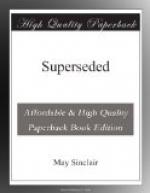Mrs. Moon restrained her feelings until her niece had moved about a bit, and sat down by her enemy the cabinet, and presented herself in every possible aspect. The Old Lady’s eyes lost no movement of the curious figure; when she had taken it in, grasped it in all its details, she began.
“Well, I declare, Juliana”—(five-and-twenty years ago she used to call her “Jooley,” keeping the full name to mark disapproval or displeasure. Now it was always Juliana, so that Mrs. Moon seemed to be permanently displeased)—“whatever possessed you to make such an exhibition of yourself? (And will you draw your chair back—you’re incommoding the cabinet.) I never saw anything so unsuitable and unbecoming in my life—at this hour of the day too. Why, you’re just like a whirligig out of a pantomime. If you think you can carry off that kind of thing you’re very much mistaken.”
That did seem to be Miss Quincey’s idea—to carry it off; to brazen it out; to sit down and read Browning as if there was nothing at all remarkable in her personal appearance.
“And to choose lilac of all things in the world! You never could stand that shade at the best of times. Lilac! Why, I declare if it isn’t mauve-pink.”
“Mauve-pink!” She had given voice to the fear that lay hidden in Miss Quincey’s heart. A sensitive culprit caught in humiliating guilt could not look more cowed with self-consciousness than Miss Quincey at that word. Criminal and crime, Miss Quincey and her blouse, seemed linked in an awful bond of mutual abhorrence. The blouse shivered as Miss Quincey trembled in nervous agitation; as she went red and yellow by turns it paled and flushed its painful pink. They were blushing for each other. For it was mauve-pink; she could see that well enough now.
“Turn round!”
Miss Quincey turned round.
“Much too young for you! Why, bless me, if it doesn’t throw up every bit of yellow in your face! If you don’t believe me, look in the glass.”
Miss Quincey looked in the glass.
It did throw up the yellow tints. It threw everything up to her. If she had owned to a little fear of it before, it affected her now with positive terror. The thing was young, much too young; and it was brutal and violent in its youth. It was possessed by a perfect demon of juvenility; it clashed and fought with every object in the room; it made them all look old, ever so old, and shabby. And as Miss Quincey stood with it before the looking glass, it flared up and told her to her face that she was forty-five—forty-five, and looked fifty.
“Louisa,” murmured the Old Lady, “was the only one of our family who could stand pink.”
“I will give it to Louisa,” cried Miss Quincey with a touch of passion.
“Tchee—tchee!” At that idea the Old Lady chuckled in supreme derision. “Capers and nonsense! Louisa indeed! Much good it’ll do Louisa when you’ve been and nipped all the shape out of it to suit yourself. However you came to be so skimpy and flat-chested is a mystery to me. All the Quinceys were tall, your uncle Tollington was tall, your father, he was tall; and your sister, well; I will say this for Louisa, she’s as tall as any of ’em, and she has a bust.”




